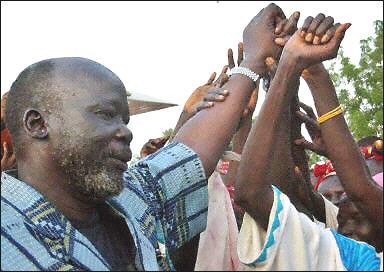After 21 years of war, south Sudan faces monumental challenges

By Beatrice Debut
RUMBEK, Sudan, June 11 (AFP) — Once it signs a definitive deal with Khartoum to end 21 years of civil war, the Sudan People’s Liberation Movement (SPLM) will face the monumental task of ruling and developing the south of the vast country, one of the most deprived and war-ravaged regions in the world.
“We are literally starting from scratch,” acknowledged the movement’s leader, John Garang, during a tour of the south to explain details of the peace process.
Over the last two years, the rebels and Khartoum have struck deals resolving the south’s grievances of domination and marginalisation by the Arab, Islamic government in the north.
Power and wealth are to be shared equitably, and the south will enjoy self-rule for six years before holding a referendum on its political future. Garang has stressed secession is an option.
In the coming months, the two sides will hammer out details of how to implement these arrangments and of a comprehensive ceasefire.
Then the real work begins.
“It’s going to be an enormous task. South Sudan has had no administration for more than 20 years,” explained Quan Xuan Dinh Mba, a US economist working in the region.
“The problem here is that guns rule. The SPLA must make the transition from armed struggle to government, and it will take time to change the mentality,” he added.
The southern town of Rumbek, which is likely to be the south’s capital, lies in ruins thanks to countless bombing raids.
The only intact buildings are mud huts. Roads are unpaved and potholed. Many teachers work for no pay.
“The people in the south have nothing, no solid buildings, no roads, no cars, no electricity,” explained the US economist.
Safe drinking water and the the most basic medical facilities are rare luxuries in most of the south.
Garang himself travels in vehicles on loan from aid agencies and a plane chartered by the US government.
Once he clinches a final peace deal with Khartoum, hundreds of thousands, if not millions of displaced south Sudanese are expected to stream back home, putting further pressure on the future administration.
Under the wealth-sharing arrangements, this government will have 1.5 billion dollars a year at its disposal, according to Garang.
“Manna from heaven,” said Quan Xuan Dinh Mba.
“For now, all the SPLA’s money is in a briefcase that follows Garang,” according to Ishac Diwan of the World Bank.
“All of a sudden, south Sudan will become one of the richest regions in east Africa,” he added, explaining this was largely due to the country’s huge oil reserves.
“The risks of corruption will be huge,” he warned.
Garang is well aware of this and has publicly pledged to ensure endemic graft does not take root.
“We want to show our people that our governement will be better than the central governement, to show them that there is a difference,” said David Deng, who is set to be civil service minister in the south’s future government.
Diwan believes the looming referendum will put pressure on this administration to curtail any excesses.
Another pressing problem for this government-to-be is a dire lack of qualified personnel.
“Less than a thousand of the 10 million inhabitants have a university degree,” according to the US economist.
There are also doubts that the comprehensive peace deal will deliver immediate security. Aside from the two main protagonists in the war, there are a couple of dozen armed groups with unpredictable allegiances that are active in the south and which were not party to the peace negotiations.
They will be keen for a slice of the cake.
And the main rebel group has no intention of disarming any time soon.
“When the people vote and decide (in the referendum), that is the end of the war,” said David Deng.
